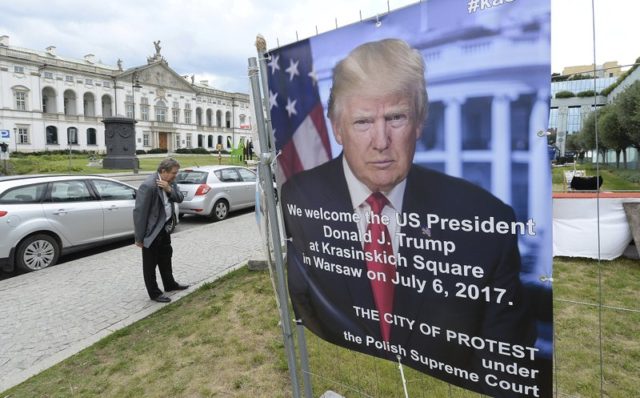WARSAW, Poland (AP) — Poland’s government would like visiting President Donald Trump to make assurances this week that the presence of U.S. and NATO troops in Poland will continue as long as the region’s security is threatened by Russia, the foreign minister said Monday.
Trump is to deliver a speech in Warsaw during a brief visit Thursday. The visit comes before Trump attends a G-20 summit in Germany, where he will meet Russian President Vladimir Putin.
Poland and other nations in the region that were under Moscow’s dominance in the communist era are concerned for their security because of Russia’s increased military activity, some of it close to their borders.
Minister Witold Waszczykowski told reporters that Poland would like to hear Trump’s assurances that the recently installed rotational presence of thousands of U.S. and NATO troops in Poland will continue. The deployments were decided by NATO and by the U.S. administration under former president, Barack Obama.
“We would like to hear that as long as the threat continues we will be supported by the U.S. and NATO troops,” Waszczykowski said.
Waszczykowski said he was less concerned about Trump’s apparent reluctance to confirm NATO’s Article 5, which says that an attack on one member is considered an attack on all, and pledges mutual defense. The president eventually did confirm his commitment to the article in a news conference on June 9.
“I am more interested in the 5,000 U.S. troops than in the monthly confirmation, by the means of rhetoric, of Article 5,” Waszczykowski said, calling those concerns an “artificially created issue.”
The U.S. Embassy in Warsaw is inviting Poles to attend Trump’s speech saying on posters and on its website it will be a “historic event.”
Trump, who will be accompanied by his wife Melania, is to meet Poland’s President Andrzej Duda and leaders of 11 other nations who will be holding a summit of the so-called Three Seas Initiative. The group is aiming to give a boost to the infrastructure and economy of the region between The Baltic, The Adriatic and The Black Sea. The goal requires significant investment, which the group will seek from the U.S. The European Union is expected to be scaling down its funds for the region, also due to criticism of some policies, chiefly in Poland and in Hungary.
“This region needs investment and needs to be catching up (with Europe’s West),” said Duda’s foreign ministry aide, Krzysztof Szczerski.
“It will be harder and harder to obtain EU funds, the needs will be growing and the gap will need to be filled,” he said.
The talks will also tackle further military and armaments cooperation.

COMMENTS
Please let us know if you're having issues with commenting.